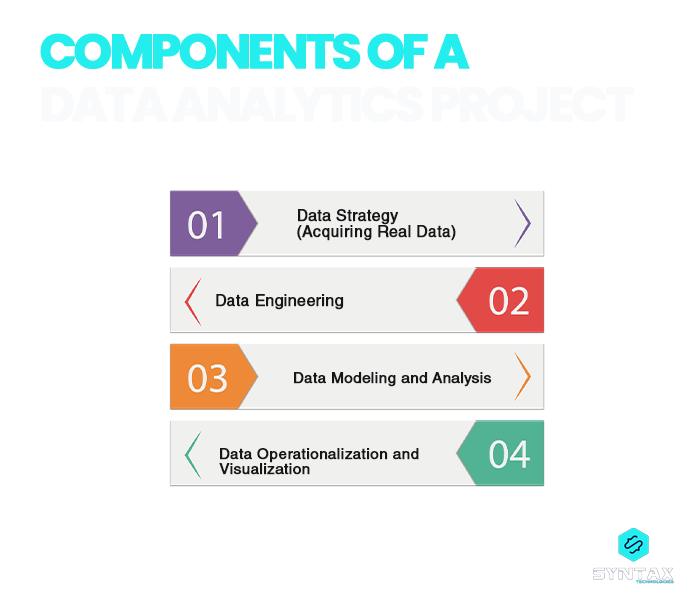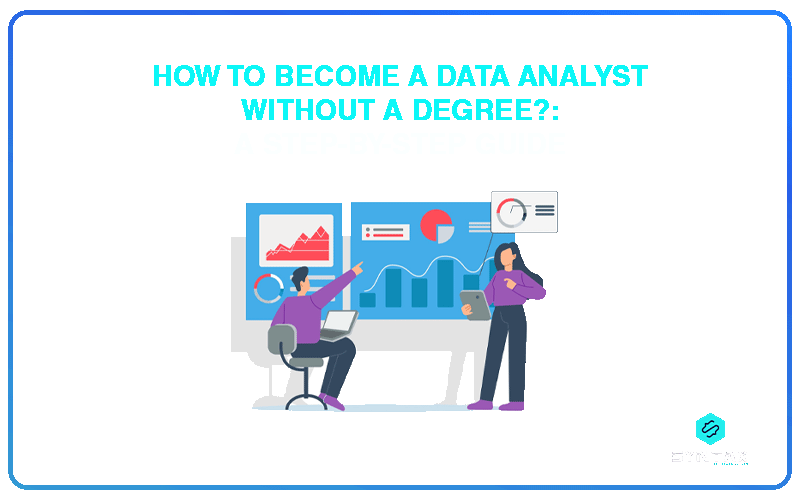We are surrounded by data, but starved for insights – Jay Baer (Marketing and Customer Experience Expert)
We are living in times when we are confronted with an abundance of data. Moreover, this data holds enormous potential in terms of guaranteeing crucial benefits to business organizations.
However, the catch lies in being able to exploit this data through the technical process of Data Analytics and thus use it to extract insights which could guide business. But the point here is that since data is the new asset; the role of Data Analysts has emerged as a venerable one.
Their demand across industries is skyrocketing and it is quite expected that many of you must be desirous of making a mark in this field.
So where do you begin? Especially when you do not possess a conventional STEM (Science, Technology, Engineering, Mathematics) degree.
We will try and answer all those questions in this blog where you will know how to become a Junior Data Analyst without a degree; and even specifically, how to become a Data Analyst without the right degree.
In this blog, we will try to answer the question of How to Become a Data Analyst without a Degree. Consequently, we will also try to look into another common concern of most aspiring Data Analysts: How to Become a Data Analyst without Math Degree?
Who is a Data Analyst?
A data analyst is a professional who collects, analyzes, and interprets large and complex sets of data to identify patterns, draw conclusions, and provide insights that can help businesses or organizations make informed decisions.
Data analysts typically work with data from a variety of sources, such as customer transactions, website traffic, social media activity, or market research surveys.
Their job involves using statistical and data skills to analyze data, creating visualizations and reports to communicate findings, and providing recommendations to stakeholders.
They often work in fields such as finance, marketing, healthcare, or technology, and can be employed in various industries such as government, non-profit organizations, or private corporations. These data professionals usually have a background in computer science, statistics, or a related field.
To know more in detail about the field of Data Analytics; check out our blog on “What is Data Analytics“
How to Become a Data Analyst without a Degree: A Career Roadmap
As an aspirant seeking to make it to a position of a Data Analyst and one who is probably thinking of how to become a Data Analyst without the Right Degree; your position might be similar to the below probable circumstances.
You do not possess a degree in a STEM related domain
You do not possess a post-secondary degree
You are already a part of a professional field which is quite different from that of Data Analytics
If your situation is somewhat close to the ones stated above, then you might feel that all doors of the Data Analytics domain are closed for you. However, this is not the case.
If you are keenly interested in the field of Data Analytics, if you love solving puzzles and enjoy working with numbers, and are interested in data analysis, along with possessing an analytical bent of mind; the doors of Data Analytics are wide open for you.
Besides a relevant degree, lack of working experience might be a discouraging factor for many aspiring to pursue a career in the field of Data Analytics.
However, this should not be the case. Know how; check out our blog on “How to become a data analyst with no Experience?: Know with us“
But it is not simply enough to have the desire to be a Data Analyst; you do need a definite action plan on how to become a successful Data Analyst without a degree. This article will provide you with exactly that.
Decide upon a Specific Course of Action
Even before you literally set yourself upon the path of pursuing your Data Analyst dream, it is important to develop some basic fundamental knowledge of the discipline, along with data analysis skills.
As you do dig deeper into the intricacies of the domain, it will not only help you to assess your potential fit within the domain, but will also help you develop an understanding of the alternate ways (besides a conventional degree course) through which you can make your way into the domain.
Acquiring Relevant Skills for Data Analysis
As you seek to know how to become skilled Data Analysts without a degree; it is important to remember that the first step towards achieving your goal is quite likely to begin with you, acquiring skills in consonance with the demands of the field of Data Analytics.
As such, a Data Analyst is an IT professional who possesses an optimum mixture of technical/hard as well as non-technical/soft skills.
Technical/Hard Skills
- Knowledge of Coding and Programming Languages such as Java, Python, R and others
- Knowledge of Database Tools such as Excel and SQL
- Knowledge of Data Visualization Services
- Knowledge of Data Mining Tools, Data Modeling Concepts, Data Analytics Process and Data Warehouse Architecture
In addition to these technical skills, it will be important for you to develop certain practical skills which will essentially involve sharpening your mathematical and statistical capabilities.
In this respect, it is important that you pay particular attention to certain topics like linear algebra, multivariate calculus and integrals. These will help you to resolve complex business issues.
Non-Technical/Soft Skills
- Excellent Communication Skills
- Ability to think critically and a problem solving aptitude
- Proficiency in domain knowledge
Hence, as you try to figure out how to become a Data Analyst without the right degree; you should remember that cultivation of the necessary technical and non-technical skills is the first significant step in your journey towards becoming a Data Analyst.
Aspiring to be a Data Analyst? Know about their required skills and competencies in detail. Check out our blog on “Top Data Analyst Skills You Need to Know“
Take up Projects involving Real Data
Data Analytics essentially deals with exploiting and analyzing data in order to derive insights which could help in achieving a particular objective.
As you strive to make a career in the field of Data Analytics, you can well resort to projects involving the resolution of some real world problems through analysis of advanced metrics in the form of real data.
These case studies can be extremely helpful in giving you a first-hand experience of the way in which the actual process of Data Analytics is carried out.
As you indulge in live projects, you can refer to large datasets available on open source platforms like GitHub, Kaggle, NASA open data, Our World in Data and so on.

Build a Strong Portfolio of Your Work
As you try to find answers to the question of how to become a Data Analyst without a degree; you must remember that a robust Data Analytics portfolio is as important as a strong resume.
A good portfolio would include a collection of your best works in the form of different Data Analytics projects.
Additionally, as you develop your portfolio, it is important to specifically choose projects which will be able to exhibit your skills as a prospective Data Analyst.
It should showcase your ability for:
- Data Collection
- Data Cleaning and Normalisation
- Data Visualization
- Data Analytics
Earn Certifications
You have cultivated the requisite skills and have built a strong portfolio, but still do not possess an advanced degree. So how to become a Data Analyst without the right degree?
If you too happen to be in such a situation, you can take recourse to acquiring professional certifications which can help you begin your journey in the Data Analytics field.
A number of companies like Microsoft, SAS, Cloudera and so on, offer professional certifications which can help you in this respect. Similarly, you can also opt for getting enrolled into bootcamps which provide a cost effective solution to earning certifications and developing skills in technical fields.
Syntax Technologies, provide you with exactly such an exciting opportunity where we help you initiate your career as a Data Analyst, even ?without the right degree?.
Look for Entry-Level Data Analysts Jobs and Internships
There is always a difference between theory and practice. While it is good to keep honing your skills and indulge in live projects and case studies; it is equally important to acquire hands-on experience of what it is really like to work as a Data Analyst in the real world.
You can gain the taste of the same through applying for internships and entry level data analyst jobs which would help you get the hang of the profession you are eventually aspiring to be a part of.
What are some of these in-demand Data Analyst jobs? Read “Top 10 High Paying Data Analyst Jobs in 2023“
How to Become a Data Analyst without Math Degree
The common assumption surrounding the profession of a Data Analyst is that; these individuals are seasoned mathematicians who remain immersed in a sea of numbers.
Such thinking is bound to unnerve individuals who are weak in the subject or in fact, who do not have a mathematical background at all. So what should they do? Should they give up their aspiration of being a Data Analyst someday?
The answer is ?NO?. In this section of the blog we will try to answer the question of how to become a Data Analyst without a math degree. This is not to suggest that mathematical knowledge is absolutely of no use in the field of Data Analytics.
However, we will try to capture a clearer picture of the extent to which this knowledge is required and the possibilities there are, for those who hail from a non-mathematical background. Thus, it is important to consider the following points:
- As someone who is desirous of making a career in the Data Analytics field, it will be important for you to acquire basic knowledge and understanding of calculus, linear algebra, probability and statistics.
- Acquiring fundamental knowledge and having a good intuition is more important than grueling yourself in mathematical processes. At best, it is important for you to know how to structure the problem and interpret the results.
- Entry level jobs or for that matter, even some of the intermediate level jobs in the field, do not require training in heavy mathematics.
- It is wrong to generalize the requirement of mathematics as being universal for the entire field of Data Analytics. Knowledge of the subject is essentially more significant within the specialized field of Machine Learning and within certain specific advanced branches of Data Science.
- It is far more important to develop a strong foothold in the field of data and programming than mathematics alone.
It is evident from the above propositions that as you seek to set your foot upon a career in Data Analytics, it is far more important for you to develop competencies which would enable you to engage in activities like Data Collection, Data Cleaning and Data Exploration and eventually help you to analyze data; rather than being involved in math alone.
You will still require developing a basic understanding of certain essential mathematical concepts; however, the requirement should not be a roadblock for you in the pursuit of your dream job as a Data Analyst.
So next time when you encounter this question of how to become a Data Analyst without math degree?; do remember that the answer to this is not a clear yes or a no. It is important to understand the extent to which this mathematical knowledge is required and develop your skills in accordance with it.
Conclusion
The landscape of Data Analytics is an expansive one. It is wrong to suggest a single source of avenue which would alone help you to become a Data Analyst. So how do you become a Data Analyst without a degree?
The answer lies in walking upon the pathway as laid down above. You can come from diverse backgrounds, may not possess a conventional STEM degree and yet be capable of pursuing a career in the field of Data Analytics.
The secret lies in having the right aptitude and bent of mind, along with the cultivation of necessary skills.
The future prospects of a career in Data Analytics are immensely promising. If you too happen to be ambitious of being a Data Analyst, do not let your non-technical background be a negative influence on your dreams.
Come and join Syntax Technologies as we prepare you to begin your pursuit of your job as a Data Analyst. Enroll now for our Data Analytics and Business Intelligence course.




